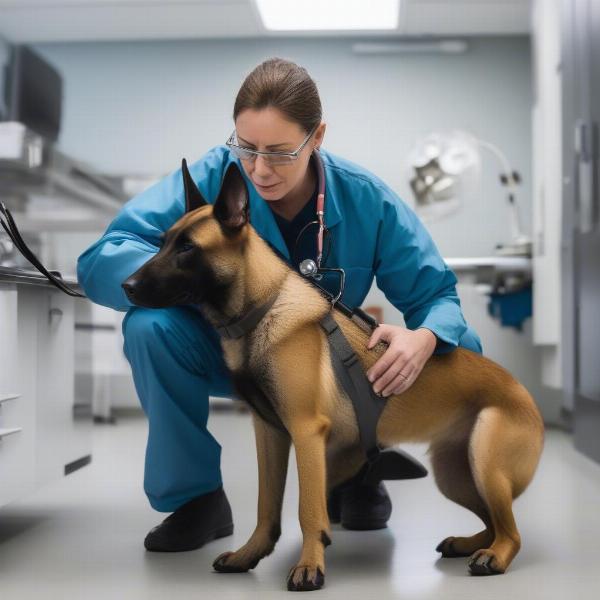Crew dogs, often associated with working dogs, encompass a diverse range of breeds and roles. From search and rescue to assistance and therapy, these remarkable canines contribute significantly to human society. This guide delves into the world of crew dogs, exploring their unique characteristics, training requirements, and the essential aspects of their care and well-being.
Choosing the right crew dog depends on the specific task and environment. Breeds like German Shepherds, Labradors, and Belgian Malinois are popular choices for their intelligence, trainability, and physical capabilities. However, less conventional breeds can also excel in specific roles. It’s crucial to research and understand the temperament and inherent skills of different breeds before making a decision.
Key Traits of a Successful Crew Dog
Several key traits contribute to a crew dog’s success. Intelligence, of course, is paramount. Crew dogs need to learn complex commands and adapt to diverse situations. A strong work ethic and a willingness to please are equally important, ensuring they remain focused and motivated. Physical attributes, such as strength, stamina, and agility, are also crucial depending on the specific role. For instance, a search and rescue dog requires exceptional physical endurance.
Training and Socialization for Crew Dogs
Crew dog training is a rigorous process that demands consistency, patience, and positive reinforcement techniques. Early socialization is crucial for developing well-adjusted dogs that can work effectively in various environments and with different people. Specialized training programs focus on developing the specific skills required for the chosen role, whether it’s detecting explosives, assisting individuals with disabilities, or providing therapeutic support.
Health and Well-being of Your Crew Dog
Maintaining the health and well-being of your crew dog is essential. Regular veterinary check-ups, a balanced diet, and appropriate exercise are crucial. ground dog screw in pegs can be useful for securing dogs during training or rest periods. Understanding the specific health concerns associated with different breeds can also help you provide preventative care and address any potential issues promptly.
 Crew Dog Receiving Veterinary Care
Crew Dog Receiving Veterinary Care
Nutrition and Exercise
A high-quality diet tailored to the dog’s breed, age, and activity level is essential for optimal performance and health. dog screws woman provides valuable insights into dog behavior and training. Crew dogs, especially those involved in physically demanding roles, require regular and vigorous exercise to maintain their physical and mental well-being. This can include running, swimming, or engaging in specific training activities.
Ensuring a Long and Fulfilling Career for Your Crew Dog
A well-cared-for crew dog can enjoy a long and fulfilling career. Providing a stimulating environment, regular mental and physical enrichment, and attentive care are essential. dog grooming crewe cheshire offers professional grooming services to maintain your dog’s hygiene and appearance. As crew dogs age, adapting their training and workload to accommodate their changing physical capabilities is crucial for ensuring their continued well-being.
dog kennels crewe can be a valuable resource for finding reputable kennels in the Crewe area. Understanding the signs of aging and providing appropriate senior care can help your crew dog enjoy a happy and comfortable retirement. A dog lead stake can be a helpful tool for securing your dog in different locations.
Conclusion
Crew dogs play vital roles in various fields, demonstrating exceptional dedication and skill. Understanding their unique needs and providing appropriate care and training are crucial for ensuring their success and well-being. From choosing the right breed to providing ongoing support and care, investing in your crew dog is an investment in a valuable partnership.
FAQs
- What are the most common breeds used as crew dogs? German Shepherds, Labradors, and Belgian Malinois are frequently chosen for their intelligence, trainability, and physical capabilities.
- How long does it take to train a crew dog? The training duration varies depending on the specific role and the individual dog, but it typically involves several months or even years of intensive training.
- What are the essential health considerations for crew dogs? Regular veterinary check-ups, a balanced diet, appropriate exercise, and preventative care tailored to the breed’s specific health concerns are crucial.
- How can I ensure my crew dog’s well-being throughout its career? Providing a stimulating environment, regular mental and physical enrichment, and adapting their workload as they age are essential.
- What are some resources for finding reputable kennels or grooming services? Online directories, local veterinary clinics, and breed-specific organizations can provide recommendations for reputable kennels and grooming services.
- What are some signs of aging in crew dogs? Decreased energy levels, stiffness, changes in appetite or sleep patterns, and cognitive decline can indicate aging.
- How can I help my crew dog transition into retirement? Gradually reducing their workload, providing appropriate senior care, and maintaining a stimulating environment can help ensure a comfortable retirement.
ILM Dog is a leading international pet website dedicated to providing expert advice and resources for dog owners worldwide. We offer comprehensive information on dog breeds, health, training, nutrition, and much more. From choosing the right puppy to providing senior care, ILM Dog is your trusted source for all things canine. Contact us today at [email protected] or +44 20-3965-8624 for expert advice and personalized support. We’re committed to helping you provide the best possible care for your furry companion.